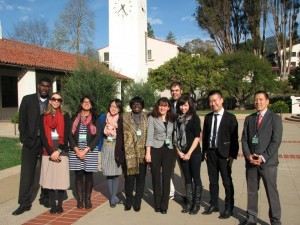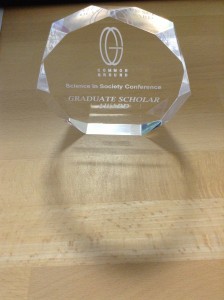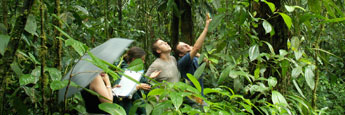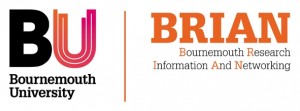 BU’s was featured last week on the Guardian HEI webpage under the Arts & Humanities sectio. The article highlights our work in computer animation to explore human responses to violent situations, crucially, without exposing anyone to harm. The article links directly to our BU Chronicle website and features a range of our research.
BU’s was featured last week on the Guardian HEI webpage under the Arts & Humanities sectio. The article highlights our work in computer animation to explore human responses to violent situations, crucially, without exposing anyone to harm. The article links directly to our BU Chronicle website and features a range of our research.
Category / BU research
HEFCE consultation on research integrity concordat – have your say
 The Higher Education Funding Council for England (HEFCE) have proposed that higher education institutions (HEIs) eligible to receive public funding for research through HEFCE should comply with a research integrity concordat published earlier this year. A consultation is currently underway inviting comments on whether compliance should become a mandatory requirement for HEIs, and how this might best be monitored.
The Higher Education Funding Council for England (HEFCE) have proposed that higher education institutions (HEIs) eligible to receive public funding for research through HEFCE should comply with a research integrity concordat published earlier this year. A consultation is currently underway inviting comments on whether compliance should become a mandatory requirement for HEIs, and how this might best be monitored.
BU is seeking your views on the two consultation questions:
- Do you agree that compliance with the research integrity concordat should be a condition of HEFCE grant?
- Do you agree with the proposal that demonstrating compliance with the research integrity concordat should be integrated into HEFCE’s existing reporting requirements, and that this represents a proportionate and reasonable way to ensure compliance?
The requirements of the research integrity concordat are summarised in the briefing paper. You can either respond to the consultation individually by noon on Friday 8 March 2013 or submit any views/comments that you would like to be considered for inclusion in BU’s institutional response to Colette Cherry, Policy Advisor to the Vice-Chancellor by noon on Friday 22 February 2013.
WORSKHOP: CORPORATE SOCIAL RESPONSIBILITY
Hello everybody,
Paolo D’Alsemi from the University of Rome Tor Vergata in Italy, specialized in Corporate Social Responsibility and author of Values and Stakeholders in an Era of Social Responsibility published by Palgrave Macmillan in 2011 is going to visit the Media School on Thursday next week.
Part of his visit is also a workshop about new approaches to CSR.
When: Thursday, January 17
Time: 9:30-10:30
Where: CG01
Please do let Georgiana Grigore ggrigore@bournemouth.ac.uk know if you plan to attend by January 15.
Below is more information about Paolo and his book.
“In this striking new book, Paolo D’Anselmi provides an entirely novel and refreshing look at the basic ideas of Corporate Social Responsibility – an area that is desperately in need of new perspective. Broadening the concept, he takes the view that all organizations should be accountable for their social responsibility – and then inquires about how this new social accountability can best be constructed for different kind of organizations. Introducing the concept of “competition” – both within and across industries and sectors – he argues thoughtfully and provocatively that best way forward is to use the knife of competition to hone the social performance of all organizations. This book provides the most searching reformulation of how to think about CSR to appear in decades”
Professor Herman Dutch Leonard, Harvard Business School
PAOLO D’ANSELMI, has been a practitioner of management consultancy and policy analysis since 1981. He teaches Corporate Social Responsibility at the University of Rome Tor Vergata, Italy. He is a graduate in Electrical Engineering (Roma Sapienza) and in Public Policy (Harvard). Since 1989, before the fall of the Berlin Wall, and throughout the 90’s, he has been a small entrepreneur in the publishing business, with ten editions of a handbook of the Italian public sector. He has also worked for McKinsey in Europe and the USA. He is now working on a new book “Making Peace with Ourselves and with Capitalism”.
Sport and Human Rights
The Leisure and Recreation Theme starts its 2013 Seminar series with a session by Dr Andrew Adams on sport and human rights. Recently Andrew has published on topics including:
Sport and leisure ethics, rights and relationships and, Do the Olympics help in securing or removing human rights? An exploration of the Olympic Game’s role as a catalyst for political change and human rights enhancement.
This promises to be a lively and thought provoking session with refreshments!
Wednesday 30th January at 2.00pm. TAG 01
Do you have an interest in internal marketing?
 Within the Entrepreneurship and Economic Growth BU research theme we have recently formed a small group looking at internal marketing.
Within the Entrepreneurship and Economic Growth BU research theme we have recently formed a small group looking at internal marketing.
Internal marketing is essentially inward facing marketing that engages with employees rather than external audiences such as customers. It is about treating staff as internal customers so that they understand and contribute to the vision and goals of the firm. Internal marketing is two-way communication process that can increase staff motivation, improve customer service and contribute the overall success of a firm. Internal marketing can also help with improving communication in all parts of the organisation and so improving overall brand values and resultant communication externally. Naturally, this theme involves the business disciplines of Marketing and HR, but we are also interested to hear from anyone who has an interest or expertise in this area who would like to get involved with this group.
If you are interested in joining this group or learning more about our plans then feel free to contact any of the group members: Julie Robson, Yasmin Sekhon, Lois Farquharson and Fabian Homberg.
Meet the BRIAN team
BRIAN – meet the team and find out all you need to know
Come and find out all you need to know about BU’s publication
management system, BRIAN, between 10am and 3pm on
17th January 2013 in the Poole House Foyer


Developing a working paper at BU
 I would like to make you aware of an exciting development at BU.
I would like to make you aware of an exciting development at BU.
A multi-disciplinary group of BU academics has been meeting over the last 6 months in order to design a online journal that is capable of acting as a central focus for the dissemination of the high quality research and scholarly outputs from UG and PG dissertations, post graduate researchers, early career researchers and established academic staff. The group has designed a developmental working paper online journal that will support ‘would be’ authors and their potential publications. Although particular emphasis has been given to maximising high quality outputs of UG and PG students and early career academics, this online journal will be capable of supporting the potential of all those engaged in research and scholarship at BU.
Below are a series of Q & As:
What’s the name of the working paper?
The provisional title is eBU: Working Papers Online
How is the working paper structured?
The working paper will not be limited to any one discipline or allied to any one particular methodology, but will aim to publish articles driven by the key BU Research Themes: (Creative and Digital Economies, Culture and Society, Entrepreneurship and Economic Growth, Environmental Change and Biodiversity, Green Economy and Sustainability, Health, Wellbeing and Ageing, Leisure and Recreation, Technology and Design). Apart from the build-up to launch, the working paper will have no deadlines or specific calls for papers. Instead, the working paper will work on a rolling submission process.
A set of author guidelines and details about formats are currently being considered and written. However, the guidelines are likely to accommodate a wide range of formats.
What are the submission processes for staff and students?
It is envisaged that staff will act as gatekeepers and encourage undergraduate and master’s students to submit high quality work into a format this is publishable. Post-graduate researchers and academic members of staff will be able to submit papers on their own accord.
After a short review from the editorial board, two designated BU academics will provide an initial quality check. The paper will then be uploaded to the internal intranet working paper site. This will allow any member of staff or student to read and offer feedback. However, within a few weeks the two designed reviewers will then provide a more comprehensive and detailed critical review. All reviews will take place in a safe, secure and INTERNAL environment. After a detailed review, students will then be encouraged to make any recommended changes and submit to external publication/or make their work available to be published on external working paper website.
This working paper is set to go live in March.
Further information
If anyone is interested in becoming involved in helping to create this online journal, and/or at an editorial level please get in touch with Andrew Harding (aharding@bournemouth.ac.uk), Andrew Adams (aadams@bournemouth.ac.uk) or Fiona Knight (fknight@bournemouth.ac.uk).
MASTERCLASS: INTRODUCTION TO GROUNDED THEORY
MASTERCLASS: INTRODUCTION TO GROUNDED THEORY
14-15 February 2013
This two day Masterclass will be an introduction to Grounded Theory – theory developed from the data. The masterclass has been designed to suit postgraduate students, academics and professionals who may wish to use grounded theory (GT) in their research but do not yet have full knowledge of the approach. The masterclass can also be taken as a stand-alone Master’s level unit of study – Contact Dr Caroline Ellis-Hill for details: cehill@bournemouth.ac.uk
Facilitators:
Immy Holloway, Professor Emeritus in the School of Health & Social Care at BU. Immy is a sociologist and has taught and supervised qualitative research for several decades. She still actively pursues her interest in qualitative research by supervising PhD students and writing articles and books. Immy used GT in her PhD before the proliferation of books and articles on GT.
Liz Norton is a Senior Lecturer at BU. Her professional background is in education and nursing and her current academic interest and work is in public health. Liz has a particular interest in Glaserian GT and her experience of using GT in practice includes completion of environment and health-related grounded theory studies for MPhil and PhD qualifications.
Quotes from previous masterclass attendees:
“Their knowledge and expertise felt like a valuable resource open to all”
“Presenters were very experienced . . . particularly high quality and effective teaching methods”
Full details of the Masterclass and the online booking form can be found at: www.bournemouth.ac.uk/masterclass
Meet the BRIAN team
BRIAN – meet the team and find out all you need to know
Come and find out all you need to know about BU’s publication
management system, BRIAN, between 10am and 3pm on
17th January 2013 in the Poole House Foyer


Research Professional
![]() Every BU academic has a Research Professional account which delivers weekly emails detailing funding opportunities in their broad subject area. To really make the most of your Research Professional account, you should tailor it further by establishing additional alerts based on your specific area of expertise.
Every BU academic has a Research Professional account which delivers weekly emails detailing funding opportunities in their broad subject area. To really make the most of your Research Professional account, you should tailor it further by establishing additional alerts based on your specific area of expertise.
Research Professional have created several guides to help introduce users to ResearchProfessional. These can be downloaded here.
Quick Start Guide: Explains to users their first steps with the website, from creating an account to searching for content and setting up email alerts, all in the space of a single page.
User Guide: More detailed information covering all the key aspects of using ResearchProfessional.
Administrator Guide: A detailed description of the administrator functionality.
In addition to the above, there are a set of 2-3 minute videos online, designed to take a user through all the key features of ResearchProfessional. To access the videos, please use the following link: http://www.youtube.com/researchprofessional
Research Professional are running a series of online training broadcasts aimed at introducing users to the basics of creating and configuring their accounts on ResearchProfessional. They are holding monthly sessions, covering everything you need to get started with ResearchProfessional. The broadcast sessions will run for no more than 60 minutes, with the opportunity to ask questions via text chat. Each session will cover:
-
Self registration and logging in
-
Building searches
-
Setting personalised alerts
-
Saving and bookmarking items
-
Subscribing to news alerts
-
Configuring your personal profile
Each session will run between 10.00am and 11.00am (UK) on the fourth Tuesday of each month. You can register here for your preferred date:
22nd January 2013: https://www1.gotomeeting.com/register/637298448
26th February 2013: https://www1.gotomeeting.com/register/267446504
26th March 2013: https://www1.gotomeeting.com/register/518275168
23rd April 2013: https://www1.gotomeeting.com/register/255287520
28th May 2013: https://www1.gotomeeting.com/register/806064201
25th June 2013: https://www1.gotomeeting.com/register/492839664
23rd July 2013: https://www1.gotomeeting.com/register/771246561
27th August 2013: https://www1.gotomeeting.com/register/398714217
24th September 2013: https://www1.gotomeeting.com/register/882372120
These are free and comprehensive training sessions and so this is a good opportunity to get to grips with how Research Professional can work for you.
Royal Society International Exchanges Scheme
 The Royal Society invites applications for its international exchanges scheme. This offers a flexible platform for UK-based scientists to interact with the best scientists around the world. Funds contribute towards travel, subsistence and research expenses, and can be requested for either a one-off short visit in order to explore opportunities for building lasting networks or for bilateral visits to strengthen emerging collaborations. Activities must be on a subject within the natural sciences, including physics, chemistry, mathematics, computer science, engineering, agricultural and medical research, and scientific aspects of archaeology, geography and experimental psychology, but excluding social science, and clinical or patient-oriented research.
The Royal Society invites applications for its international exchanges scheme. This offers a flexible platform for UK-based scientists to interact with the best scientists around the world. Funds contribute towards travel, subsistence and research expenses, and can be requested for either a one-off short visit in order to explore opportunities for building lasting networks or for bilateral visits to strengthen emerging collaborations. Activities must be on a subject within the natural sciences, including physics, chemistry, mathematics, computer science, engineering, agricultural and medical research, and scientific aspects of archaeology, geography and experimental psychology, but excluding social science, and clinical or patient-oriented research.
Applicants must have a PhD or equivalent research experience and hold a permanent or fixed-term contract in an eligible university or research institute for the duration of the project. Collaborations should be based on a single project involving the UK-based scientist and the overseas-based scientist. Collaborations with any country outside the UK are eligible for this scheme.
Applicants may request:
•up to £3,000 for one-off travel lasting up to three months;
•up to £6,000 for multiple visits to be completed within one year, including a maximum of £1,000 for research expenses;
•up to £12,000 for multiple visits to be completed within two years, including a maximum of £2,000 for research expenses.
Closing date: 20 February 2013
For further information, click here.
The RKE Operations team can help you with your application. Please direct any enquiries to RKE Ops in the first instance.
ESRC: Celebrating impact prize
This prize is intended to recognise and reward ESRC-funded researchers who have achieved, or are currently achieving outstanding economic or societal impacts through their research and collaborative working, partnerships, engagement and knowledge exchange activities. There are six categories for this prize: impact in business, impact in public policy, impact in society, international impact, early career impact, impact champion of the year.
A prize of £10,000 will be made to the winners of each category, with a further £10,000 for the department with the impact champion of the year.
The application deadline is 16.00 on 14 February 2013.
For further information please click here.
The RKE Operations team can help you with your application. Please direct any enquiries to RKE Ops in the first instance.
HSC Student receives Graduate Scholar Award at University of Berkeley Conference.


Sheetal Sharma, HSC presented at the Science in Society conference (SiS) at Berkeley University in November 2012 where she received a Graduate Scholar Award http://science-society.com/the-conference/graduate-scholar-award
As a PhD student presenting it’s an opportunity to practice for the inevitable viva and a chance to reflect on your work, as there’s always a question you do not expect. For instance, I had a few questions on cultural aspects of my PhD mixed-methods evaluation. That helped me prepare for my transfer viva, where I was asked on the cultural context of the health promotion intervention, specifically in a country context, run by Green Tara Nepal: http://www.greentaratrust.com/ The plenary was the Presidential Commission for the Study of Bioethical Issues http://www.bioethics.gov/cms/node/778 on ethics and morality of science.
Conferences can be competitive, in the sense, you need to be accepted. Secondly you also can compete for a ‘free space’ and in this instance you were able to compete to be a chair. At SiS, graduate students were invited to, through a very formal application process, to be chair of session. Although it means you won’t attend certain talks, the trade-off is worth is as one is forced to think of questions or how to manage, and be critical and aware of several issues of research.
Being ‘forced’ to be critical led to my planning more what aspects I want to present to the audience. This conference was concerned with the science of health, its epistemology and helped me think of how to discuss the development of theory. As in a PhD viva one might need to answer ‘new knowledge to the field’ how the theory or models proposed are better than competing theories.
I was also lucky to visit Howard University, where I spend time researching cultural ‘appropriateness’ of health programmes, specifically should postnatal care be done again at 40 days. For my PhD evaluation of the Green Tara Nepal that the cultural sensitive aspect led to its increase in health services uptake. I encourage those interested to visit their work as they are ranked school in the top 20% of social work programmes. The World Bank and USAID frequently have invitations to talks, the ones I attended highlighted the focus of women in development, what role programmes can play to develop rural areas; as it is women in Nepal who ‘stay’ in the villages to farm and care for the family as men migrate abroad or to the capital city Kathmandu.
This experience helped me begin the reflection of what my evaluation means, whether in a policy context or the epistemological context; on my return I spoke to my supervisory team. Prof. Edwin van Teijlingen, Prof. Vanora Hundley, Dr. Catherine Angell and my external supervisor Dr. Padam Simkhada (University of Sheffield) who encouraged me to on this basis strengthen my writing for my discussion on what the research done has meant.
An opportunity for PhD and Masters Students to present your research! – Deadline extended
The International Conference on Events: Making Waves ICE2013
This e-poster conference is a great opportunity for PhD and Master Students to present their research to scholars and practitioners at The International Conference on Events (ICE2013) and 10th AEME Forum taking place 3-5 July at Bournemouth University.

Please submit your proposals under one of the following themes:
- Making waves – transformational power; mega & major events; social media & technology; employment & careers; ISO20121
- Riding the waves – Experiential events, learning & research; hyper real experiences; festivity; rituals & rules
- Challenging the waves – policy & practice; creativity & design; discourses & narrative; imagination & dreamscapes
- Working the waves – Business Events; professionalisation; the revised purple guide; security; knowledge transfer; imagery, symbols & semiotics
- Create a new wave by proposing original ideas or concepts not covered above.
Key Note Speakers
- Professor Don Getz, Professor Emeritus and Adjunct Professor in the Haskayne School of Business, University of Calgary, Canada.
- Professor Leo Jago, Chief Economist for Tourism and General Manager of Tourism Research Australia.
- Professor Stephen Page, Professor in the School of Tourism, Bournemouth University.
- Mr Jon Weaver, Marketing and Events Manager for Bournemouth Borough Council.
The E-poster submission deadline has been extended until: Thursday 31 January 2013
For more details see the Making Waves ICE 2013 website.
Science & the Media mini-conference to be held 2 pm Wednesday (12 Dec), CG01
Several Media School colleagues will present their research on Science and The Media Wednesday afternoon. Topics include public perceptions of science, blogging in Antarctica, representations of space on the web, news framing of nanotechnology, and science journalism after the Leveson Inquiry.
Members of the Science and Media research cluster, an emerging group within the Media School, have organised this mini-conference to open a dialogue amongst colleagues across the university regarding the ways in which science and media intersect. The event is intended to be casual, so please come for all or part of the discussion.
The mini-conference will be held from 2-4 pm in CG01 Wednesday (12 Dec); please see the Agenda for more detail.
If you have any questions, please don’t hesitate to get in touch with Shelley Thompson, Stuart Allan or An Nguyen in the Media School.
Environmental Change & Biodiversity Research Theme seminar on Thursday!
 The Environmental Change & Biodiversity Research Theme is holding its third and final seminar of the term on Thursday 13 December. The seminar will be held in Christchurch House CG13 at 1200. Tea and coffee and biscuits will be provided.
The Environmental Change & Biodiversity Research Theme is holding its third and final seminar of the term on Thursday 13 December. The seminar will be held in Christchurch House CG13 at 1200. Tea and coffee and biscuits will be provided.
Kevin Wood will present some results from his PhD on mute swan-plant interactions in the River Frome. The swans are sometimes considered a pest, because when in large numbers can significantly depelte the amount of vegetation in such rivers with potential negetative effects on trout and salmon. The title of his talk is “Go with the flow: seasonal changes in water velocity determine foraging patch choice by mute swans”. The seminar will also be a chance for any new first year PhD students to present a few slides about their PhD, as was done by a few students in a previous seminar. Please let Richard Stillman know if you would like to present at an upcoming seminar.
Please note room change – From suffragettes to 21st century slut walks – women, PR dissent and protest.
 Wednesday, 12th December at 4pm in Room CAG01
Wednesday, 12th December at 4pm in Room CAG01
Heather Yaxley considers the role of women in dissent PR ranging from the suffragettes to the 21st century phenomenon of slut walks. The position of women outside the dominant social power base suggests a need for radical activism to enable their voices, and causes, to be heard. Issues relating to sexualisation and other stereotyping are examined in the context of how women over the last century have championed feminist issues. Finally, reflection on role of women in dissent, activism and protest movements outside the mainstream is contrasted to their increasing dominance of the professional occupation of public relations.
A hybrid academic-educator-practitioner-consultant, Heather Yaxley is researching career strategies in public relations for her PhD at Bournemouth. Her biography can be found at http://www.prconversations.com/index.php/contributors/heather-yaxley/
RDU Small Grant Fund Winner- Update
In November 2011 I (Joanne Mayoh) was the recipient of one of the first BU Research Development Fund (RDF) Small Grant Scheme prizes. This award gave me the opportunity to travel to Champaign (Illinois) in May 2012 to present a paper at the International Congress of Qualitative Inquiry. The budget covered my travel to Illinois, hotel accommodation, conference fees for the five day event, and sustenance costs during this time. As an early career researcher, who has only started publishing within the last few years, this was an excellent chance for me to receive support to present internationally, and engage in essential networking and profile building.
In addition to the conference paper, this opportunity resulted in targeting networking with a number of influential methodologists, and the submission of two journal articles, and a further (accepted) conference abstract in collaboration with a newly formed contact. This new associate is one of the most experienced mixed methodologists currently publishing within my target journals, and is therefore an invaluable connection for at this stage in my career.
The process of applying for RDF funding was extremely simple and one that I would recommend my colleagues engaging with if they have any need for a small grant. I would definitely apply to this fund in the future to support conference attendance, research support or general networking. Overall it was a wonderful experience, and I am very grateful for the support from BU and the Research Development Unit.















 April’s Café Scientifique – Should we help machines understand and respond to our emotions?
April’s Café Scientifique – Should we help machines understand and respond to our emotions? Postgraduate Research Experience Survey (PRES) 2024 – 2 WEEKS LEFT
Postgraduate Research Experience Survey (PRES) 2024 – 2 WEEKS LEFT Working with The Conversation: online training session – Wednesday 8th May
Working with The Conversation: online training session – Wednesday 8th May Apply for up to £1,000 to deliver an event and take part in a national festival of public engagement with research
Apply for up to £1,000 to deliver an event and take part in a national festival of public engagement with research MSCA Postdoctoral Fellowships 2024
MSCA Postdoctoral Fellowships 2024 Horizon Europe News – December 2023
Horizon Europe News – December 2023